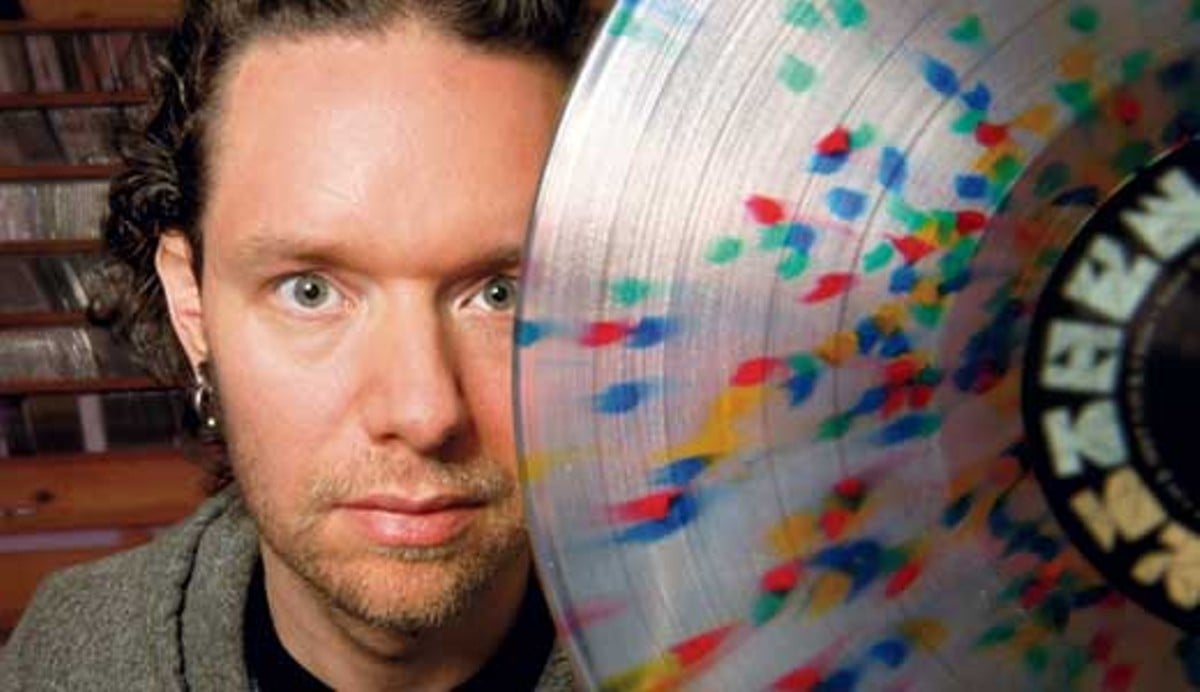Joseph Cornell Jr. liked to think inside the box. One of four children born to middle-class Dutch parents, he was painfully shy and rarely left Flushing, N.Y., where he lived for most of his life.
Behind closed doors, junior’s creativity thrived. He dabbled in abstract filmmaking, but his forte lay in collecting souvenirs, old print photographs and renaissance paintings, and grouping those unlike elements into glass-covered mementos. Before his death in 1972, the effect of Cornell’s Medici Slot Machine reverberated far beyond his home on Utopia Parkway.
Like Cornell, Robert Rauschenberg loved to recycle. In the 1950s, Rauschenberg attended Kansas City Art Institute and Black Mountain College and studied under Bauhaus alum Josef Albers. Rauschenberg often employed found objects and photographs in his paintings, and he championed the role of the “creator” in art.
Joseph Beuys took that role one step further. A part-time circus animal caretaker who studied piano and cello, Beuys’ aptitude for sculpture and drawing was eclipsed only by his commentaries on art’s socio-political function, and the belief that great sculpture required multiple disciplines and participation.
Jeremy Devine studied these artists as a teenager at duPont Manual High School. As owner of Temporary Residence, now in its 15th year, Devine’s goal has been to facilitate “found art” by dissimilar individuals and present it via a single medium: records. He champions the role of songwriters, and while at times the music business can resemble a circus, he operates by one simple tenet: Love the songs and the people who write them first.
“At the risk of sounding hokey, this label is very much a family,” Devine, 34, writes via e-mail from his office in Brooklyn, N.Y. “Most of the artists are friends … and have a sincere admiration and respect for one another. The circumstances behind how each artist ended up on the label are different, but there’s no denying the inherent sense of community that we all share. There’s also an intangible sentimentality that most of us seem to possess that I can’t quite explain, but I’m constantly reminded of its presence.”
That sentimentality is producing results. Once a bedroom operation, Temporary Residence Records, or TRL, is nearing its 200th release, a milestone made even more remarkable in an era when musicians don’t need record labels to distribute their music and can keep the profits themselves. TRL artists tour nationally and internationally, are featured in major music magazines around the world, and their music pops up on television shows and feature films.
TRL put out its first record in 1996 — a split 7” single by Devine’s band, The Concord Anthology Process, and another Louisville group called Nero. In previous interviews, Devine has said he never wanted to compete strictly on a local level, and TRL’s catalog includes artists from as far away as Australia and Japan.
But it was a band from Austin, Texas that changed everything.
Explosions
American Analog Set bassist Lee Gillespie couldn’t believe what he was hearing, but at least he knew who the band was: a singerless quartet called Explosions in the Sky.
Formed in 1999 as Breaker Morant, the group renamed itself after drummer Chris Hrasky’s statement about fireworks he saw leaving a radio gig in Austin. It was an apt description for their music: alternately volcanic and ethereal, loud and soft, a heavy emphasis on dynamics. The band had distributed its first album, How Strange, Innocence, via CD-Rs, but Gillespie stumbled upon a live recording, which he mailed to Devine along with a note: “DUDE, THIS TOTALLY FUCKING DESTROYS.”
“I actually thought it sounded a lot like instrumental Dinosaur Jr.,” Devine says now, “but later I realized that was just the poor recording quality of the live show.”
Impressed, Devine called guitarist Munaf Rayani, and ended up talking to him “for six or eight hours.” In December 2000, Explosions in the Sky drove to Baltimore to stay at Devine’s row house and begin a weeklong recording session in Washington, D.C.
“We never thought about this band as being our career 10 years later,” Hrasky says. “But we showed up and didn’t know what to expect. (Jeremy) opens the door, and the whole place is kind of a mess: records on the floor, shelves made of wooden planks, and it was freezing cold. Jeremy says, ‘Oh yeah, we didn’t pay our heating bill this month, so there won’t be any heat while you’re here.’ So we ended up staying with him for a week, sleeping with our hats and parkas and gloves on. He was just broke at the time, and his roommates were broke. He drove us 40 minutes to D.C. every day to record. The friendship began pretty quickly.”
Explosions in the Sky gained unwanted media attention surrounding the August 2001 release of Those Who Tell the Truth Shall Die, Those Who Tell the Truth Shall Live Forever. The album artwork featured a photograph of an airplane with the caption, “This plane will crash tomorrow,” and airport security detained bassist Michael James and asked why that sentence was written on his guitar.
Two years later, major media again turned its attention to Explosions, but for good reason. “Friday Night Lights: A Town, a Team, and a Dream,” written by Pulitzer Prize-winning reporter H.G. Bissinger III, was being made into a film starring Billy Bob Thornton. Music supervisor Brian Reitzell (“Lost in Translation”) was in charge of the soundtrack, and he chose Explosions to write the bulk of it.
The plot centered on the 1988 Permian Panthers High School football team in Odessa, Texas, and its quest to win the state championship. Bissinger, a sports writer for The Philadelphia Inquirer, moved his family to Odessa to document the entire season. “Friday Night Lights” opened in theatres on Oct. 8, 2004, grossed $61 million domestically and, was later adapted into a television series for NBC.
For TRL and Explosions in the Sky, this exposure meant swift success.
“We as a band and Jeremy as a label had to play catch up,” Hrasky says. “All of a sudden, so much of his energy had to be focused on us; people knew who we were, and our records were selling well. It was much, much bigger than we had ever imagined.”
“It was an honor to be a part of a film like that,” says Devine, an avid cinephile. “That’s a film that I would have championed regardless of my involvement in its creation. Even the TV show is good.”
“Friday Night Lights” fundamentally changed how TRL albums were distributed to stores. Up until the film’s release, Devine had renewed his agreements with Portland-based distributor NAIL, which serves independent record stores like ear X-tacy. To have TRL releases for sale in big-box retail chains like Best Buy, though, Devine needed the attention of a larger company, Alternative Distribution Alliance.
The success of “Friday Night Lights” gave Devine the leverage he needed. “Everything happened at the right moment,” he says. “NAIL had never distributed a band who had scored a major motion picture, and the timing was such that we were up for renewal (with them).”
At the same time, independent artists like Sufjan Stevens and Antony & the Johnsons had broken into mainstream media, thereby gaining a larger audience, and, consequently, more interest from big-box retail.
“If it wasn’t for ‘Friday Night Lights,’ we wouldn’t have had nearly as much to contribute to this overarching thing that would make ADA want to work with us,” Devine says. “The effect was instantaneous.”
Explosions in the Sky traveled to England last year to open for Radiohead, and this April it will headline Radio City Music Hall in New York. The band continues to enjoy healthy representation in TV and film, and its profile has helped raise awareness of other TRL artists.
One-time Louisville resident Matthew Cooper, who performs under the name Eluvium, is scoring “Some Days Are Better Than Others,” starring The Shins’ James Mercer, as well as recording for “Elizabethtown” director Cameron Crowe. After high school, Cooper moved to Portland where he worked at a record store Devine frequented. “He asked me what I’d been up to. I’m not sure if he was expecting a CD as a response, but I had some work of mine on me, and I said, ‘This is what I’ve been up to.’ That was really our first proper interaction together.”
Eluvium’s albums follow two recurring themes in the label’s catalog: an affinity for instrumental music and a focus on how records are packaged. About five years ago, Cooper and Devine kicked around the idea of releasing a vinyl boxed set of Eluvium’s studio recordings. “I had this vision of something similar to the old 78-r.p.m. books, and that I wanted my wife, Jeannie Paske, to make some original artwork for it,” Cooper says. “But outside of those initial ideas that I gave to Jeremy, he really took care of the rest.”
Production was a slog, mainly because of logistics and a touch of bad luck. Paske’s original drawings were lost in the mail. Once new ones were completed, Cooper and Devine had to find a printer who could make them look as if each were hand-drawn, a process that required them to approve each drawing as it was being printed. “Everyone we worked with was so thorough and helpful,” Cooper says. “I think they really appreciated the scope of what we were trying to do.”
Finally in 2009, after two years in production, TRL released Eluvium’s Life Through Bombardment as a seven-LP collection in a 14-by-12 1/2-inch hardbound book with gold embossed print along the spine. The 1,000-copy print run sold out.
Working on Life Through Bombardment reaffirmed what Cooper calls Devine’s “odd grace.”
“Most of our conversations, even when I’m working on a record, usually involve other things — movies, food, a lot of nonsense and silliness and just good friends hanging out together,” Cooper says. “I’m not sure if it’s on purpose or not, but it takes away from the stresses that can occur when releasing and producing new music. He genuinely seems completely unfazed about how it might be going and has trust in your ability to pull it off.”
Home cooking
Devine has lived up to TRL’s namesake, relocating to Baltimore, Portland, Manhattan and now Brooklyn. But he has always kept one finger on the pulse of what’s happening in his hometown. In 2005, he reissued the CD version of Crain’s landmark Speed, which engineer Steve Albini (Nirvana, Joanna Newsom) recorded on an eight-track in 1991. TRL’s roster of active Louisville bands includes Young Widows, Coliseum and Parlour.
Young Widows singer and guitarist Evan Patterson, who met Devine when he was 13, came to TRL when his band’s previous label, Jade Tree, was losing steam. Young Widows releases its second album on TRL, In & Out of Youth & Lightness, this April. Coliseum, led by Patterson’s older brother Ryan, joined the roster for its last studio album, House With a Curse, and the re-release of its debut, Goddamage.
“Jeremy is the most hands-on label owner I have ever experienced,” Evan Patterson says. “He is low-key, but artist supportive. His opinions of the overly flooded music industry are always insightful and pushing. Dealing with a label that is discouraging or non-responsive can leave a shit flavor lingering for a lifetime.”
Devine hasn’t lost any steam, thanks largely to a low overhead cost. He employs two full-time people besides himself, and hires a rotating cast of interns. He has final say on which records will be released, pays for recording and production costs of each release, and splits his net profits 50-50 with each artist. Until he left his day job at Portland’s Jackpot Records in 2004 to move to New York, he worked mainly out of his home.
His first actual office was a 400-square-foot space in Midtown Manhattan that looked like a scene from Michael J. Fox’s “Secret of My Success.” It sat vacant for three years, and the landlords were offering it for a fraction of what it would normally cost.
“We leased it from this company who managed producers and songwriters. They managed 80 percent of the major pop songwriters and producers that you know of,” Devine says. “The money that came in was staggering. Gold and platinum and diamond record plaques, like what you would see in like the cheesiest movie industry film.”
Credits on the ’80s movie rolled once the landlord found an advertising agency willing to spend $10 a square foot to rent the space. Devine moved TRL to its current offices in Brooklyn. “By then, the novelty had worn off.”
Future heart
In the 1990s, major labels started taking independent rock acts and the independent labels that released their records more seriously — seriously enough to try to sign those acts, buy out their back catalogs, and buy the labels in an attempt to bolster street credibility with fickle, intelligent music listeners.
Right after “Friday Night Lights” was released, the major-label buying spree came to Devine in the form of a phone call from a representative of Universal Records. It was interested in signing Explosions in the Sky, but as the conversation progressed, the representative also brought up buying TRL.
Devine turned down the offer as a bad deal not only for him, but also for Universal. “Suppose I did (sell),” he says. “For one, they would now have this enormous price tag on everything. Let’s say they were going to give me $1 million to buy this brand. Now, instantly, they would have this huge overhead that they could never recoup. The reason we take a gamble on so much of what we do is because we believe in what we do. You can’t really fetishize Universal. No one says, ‘I collect Universal Records. I really like the relationship they have with Justin Bieber.’
“This isn’t really a brand,” Devine says. “We’re not trying to trump this up to increase the value of it and sell it off.”
The other reason it would never have worked is that Devine doesn’t do contracts with a lot of his artists. “It was somebody talking out of their ass, somebody who really had no authority to make the deal in the long run.”
In the long run, Devine’s business model will remain more or less the same: release compelling music in a physical format as well as digital. Ninety-five percent of TRL’s digital sales come from iTunes, 3 percent come from eMusic, with other digital retailers making up the difference.
Most major digital retailers take a cut of an artist’s gross sales, but Devine says he has no plans to sell downloads directly through TRL’s website, www.temporaryresidence.com. “Plenty of labels have tried (digital stores) and spent an enormous amount of money,” he says. “Setting it up is going to cost you at least five figures to do it, and you’ll never make your money back.”
This reliance on TRL’s core business — the sale of physical LPs and CDs — speaks to Devine’s art school education. If TRL is an art gallery, he is curator, presenting not only what he wants you to hear, but also what he thinks you should. That selection process, he says, carries an inherent financial risk, because not every album he likes enough to put out will sell 50,000 copies.
But it is a risk he takes time and again. Artists focus their effort where it’s needed: in writing and recording great music, he says, but they may not have enough capital, energy or know-how to sell their music in a crowded marketplace.
“While there are plenty of discovery engines like Rhapsody and Grooveshark out there, the inherent context of a label whose releases you’ve grown to trust guarantees a certain level of quality control to your choices that scanning thousands of random songs just can’t have,” he says. “We lose money on records all the time, but those losses are offset by our successes. That’s a buffer that most artists don’t have.”
How long that buffer lasts is the question. Devine has the distinction of operating a record label pre- and post-Napster, making him cautious of doomsday predictions but willing to call it like he sees it.
“In one respect, I really admire and appreciate that, as underground musicians, the Internet has finally leveled the playing field,” he says. “In this age of Arcade Fire playing the Grammys and Vampire Weekend providing the most pervasive TV commercial soundtracks, it’s clear that an independent artist can become enormously successful in ways that bands like Nirvana and Sonic Youth (and even the Melvins) surely felt required major label backing in ’80s and ’90s.”
But he admits illegal downloading now hurts independent record labels as much as majors, and specifically the genres of underground hip-hop, experimental music, electronic music and dance.
“It has created a culture that no longer feels the same allegiance to independent musicians. There’s this impression that independent musicians and labels aren’t struggling anymore, which, when coupled with the ability to access music free and easy with two clicks of a mouse, fosters the music industry’s version of the disappearance of the middle class.”
Despite an uncertain future, Devine doesn’t plan to close his art gallery anytime soon.
“I intend to do this until I no longer enjoy it, or until the music industry completely collapses,” he says, “whichever comes first.”






